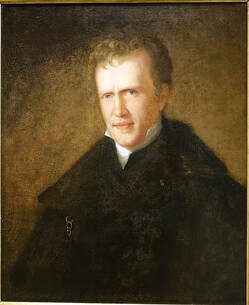 John Neal in a portrait by Sarah Miriam Peale circa 1823
John Neal in a portrait by Sarah Miriam Peale circa 1823 Born on August 25, 1793, Neal was an American writer, critic, editor, lecturer, and activist. Considered both eccentric and influential, he delivered speeches and published essays, novels, poems, and short stories between the 1810s and 1870s in the United States and Great Britain, championing American literary nationalism and regionalism in their earliest stages. Neal advanced the development of American art, fought for women's rights, advocated the end of slavery and racial prejudice, and helped establish the American gymnastics movement.
The first American author to use natural diction and a pioneer of colloquialism, John Neal is the first to use the phrase son-of-a-bitch in a work of fiction. He attained his greatest literary achievements between 1817 and 1835, during which time he was the first American published in British literary journals, author of the first history of American literature, America's first art critic, a children's literature pioneer, and a forerunner of the American Renaissance. As one of the first men to advocate women's rights in the US and the first American lecturer on the issue, for over fifty years he supported female writers and organizers, affirmed intellectual equality between men and women, fought coverture laws against women's economic rights, and demanded suffrage, equal pay, and better education for women. He was the first American to establish a public gymnasium in the US and championed athletics to regulate violent tendencies with which he struggled throughout his life.
A largely self-educated man who attended no schools after the age of twelve, Neal was a child laborer who left self-employment in dry goods at twenty-two to pursue dual careers in law and literature. By middle age Neal had attained comfortable wealth and community standing in his native Portland, Maine, through varied business investments, arts patronage, and civic leadership.
Neal is considered an author without a masterpiece, though his short stories are his highest literary achievements and ranked with the best of his age. Rachel Dyer is considered his best novel, "Otter-Bag, the Oneida Chief" and "David Whicher" his best tales, and The Yankee his most influential periodical.
As early as 1817, Neal began to advocate for equal rights for women -- a topic virtually unknown in American or British politics. Neal delivered America's first women's rights lecture as an Independence Day address in Portland, Maine in 1832. He declared that under coverture and without suffrage, women were victims of the same crime of taxation without representation that caused the Revolutionary War. His "Rights of Women" speech (1843) at the peak of his influence as a feminist had a considerable impact on the future of the movement.
The "Rights of Women" speech was widely covered, albeit dismissed, by the press, and Neal printed it later that year in the pages of Brother Jonathan magazine, of which he was editor. He used that magazine in 1843 to publish his own essays calling for equal pay and better workplace conditions for women, and to host a printed debate of correspondence on the merits of women's suffrage between himself and Eliza W. Farnham. Neal became prominently involved as an organizer in the women's suffrage movement following the Civil War, finding influence in local, regional, and national organizations.
When the American Equal Rights Association split in 1869 over the Fifteenth Amendment, Neal regretted the division of efforts, but lent his support to the subsequent National Woman Suffrage Association because of its insistence upon immediate suffrage for all women. He cofounded the New England Woman Suffrage Association in 1868, organized Portland's first public meeting on women's suffrage in 1870, and cofounded Maine's first statewide Woman Suffrage Association in 1873. Looking back more than forty years later, the second volume of the History of Woman Suffrage (1887) remembered that the lecture "roused considerable discussion ..., was extensively copied, and ... had a wide, silent influence, preparing the way for action. It was a scathing satire, and men felt the rebuke."
Neal was also an advocate for abolition and the rights of African Americans and indigenous native people, opposed dueling, class divisions, regressive taxation and lotteries -- which he viewed as manifestly unfair to the poor -- and capital punishment. He also argued for liberal bankruptcy laws to relive the burden of crushing debt in an era of unregulated money lending and the continuing practice of debtors' prisons in England.
Neal has been described as a "scattered genius" and many of his ideas were considered not merely revolutionary, but incendiary. In some of his works there is even indications that he favored the rights of what today we would call the LGBTQ+ community -- a subject that could not be discussed openly even among academics in the 19th century. His contemporary, Edgar Allen Poe said that he was "inclined to rank John Neal first, or at all events second, among our men of indisputable genius", but in the same paragraph rated his work as "massive and undetailed", "hurried and indistinct", and "deficient in a sense of completeness." His biographer Donald A. Sears classified him as "a writer without a masterpiece" who "lived to be eclipsed by writers of lesser genius but greater control of their talents." Many scholars conclude that most defining authors of the mid-nineteenth-century American renaissance earned their reputations by employing techniques learned from Neal's work earlier in the century, among them Ralph Waldo Emerson, Walt Whitman, Poe, and Herman Melville.
 RSS Feed
RSS Feed